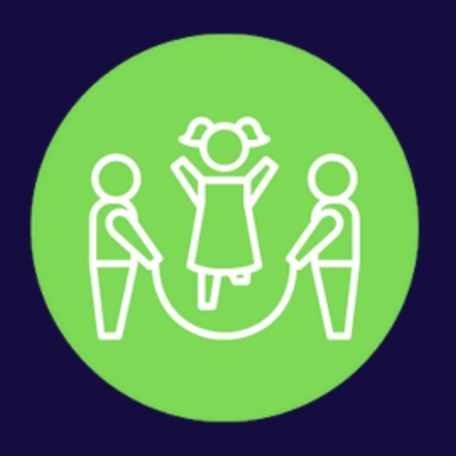Playful Toolkit Activities to Improve Collaboration
Three activities that use imagination and play to help address obstacles to and improve collaboration
Dear collaborative discussion friends,
This week we are highlighting three activities that use play to help participants address and engage with some of the challenges of collaboration, such as engaging with uncertainty and complexity, being open minded and practicing empathy, recognizing shared humanity beyond specific opinions or positions on an issue, and dealing with an imbalance in power during discussions. These activities will help them embrace ambiguity, practice generous interpretation and reflect on and challenge the existing power dynamics in a discussion in order to improve collaboration. All the activities in the toolkit have an activity key that indicates the level of the activity (beginner or advanced) and other characteristics using icons. Activities that use playful methods are denoted with the following icon.
If you missed the previous newsletter, Playful Perspective Taking, you can access it and our other weekly newsletters by subscribing below.
This week's activities:
Activity 3.4 – Developing Comfort with Ambiguity
Activity 3.7 – Practicing Generosity of Interpretation
Activity 4.7 – Recognizing Power Imbalances in Decision Making
Three activities that use imagination and play to enhance perspective taking
Activity 3.4 Developing Comfort with Ambiguity helps participants engage with complex moral dilemmas, where there is often no right or ideal option and where choosing one option means leaving other options that are just as good on the table. Participants are encouraged to push past “good-vs-bad” binary thinking and sit with discomfort of ambiguity and uncertainty. It also helps participants appreciate the complexities involved in making decisions and how often you need to decide on a course of action even when there is no perfect path. It also demonstrates how new information can often change perspectives and decisions, encouraging them to be being open to change and not trapped by a sense of moral certainty in ambiguous and complex situations.
Participants are first presented with a moral dilemma and, in small groups, asked to share initial reactions and take an initial position, even if it feels uncomfortable or the ideal option is not available. They then discuss the dilemma, asking questions to better understand the reasoning and values informing the positions of others in their group and sharing their own argument for the position they chose. Participants are also asked to expand their thinking by offering an argument for an opposing view. Once the discussion slows down, “monkey wrenches” or twists are introduced that add new variables or alter the situation in some way to get participants to rethink their initial position. Participants then share with the group if their position was changed by this new information and why.
By developing comfort with ambiguity and uncertainty, participants will be better able to be present and open to new information even when in conflict or in a tense situation. Participants will also develop a better understanding of and empathy for decision-makers operating within complex or crisis situations.
Activity 3.7 Practicing Generosity of Interpretation helps participants approach a discussion with people they find challenging or about a controversial topic from a place of generosity, patience, and empathy. It introduces guidelines and methods to help them be patient and see the humanity in others. This activity also encourages participants to develop their own strategies. Participants then practice intentionally using these principles and mental tricks while engaging in a discussion around a challenging topic.
By developing mental techniques to humanize others ahead of time, especially those whom they have trouble engaging in a conversation with, participants are able to maintain an open mind when they find themselves in a challenging situation or conversation. Even when they disagree with someone, they are able to engage with them empathetically and to see their shared humanity.
Activity 4.7 – Recognizing Power Imbalances in Decision Making helps participants examine the role power plays in our society, specifically in group decision making. This activity shows how power can work in both obvious and more subtle ways. It demonstrates how power can reinforce the status quo, including existing biases and stereotypes. Participants are also encouraged to critically examine and challenge existing power dynamics.
This activity helps participants reflect on the way different biases, assumptions and stereotypes both influence and are influenced by the power dynamics in a group, which in turn affects how the group arrives at any particular decision. Participants are organized into small groups and introduced to a scenario in which a decision has to be made. Each person is then randomly given an envelope with beans and asked to choose a stakeholder to play in the given scenario based on the number of beans they have. The number of beans represents the number of times they can contribute to the discussion and, therefore, the amount of power they have. Participants then share what stakeholder they have chosen to role play with their group. Each group then engages in a discussion about the chosen scenario, with the aim of reaching a decision by the end of the conversation.
This activity helps participants critically examine the relationship between biases, stereotypes and power imbalances and enables them to challenge the unfair distribution of power in society and in discussions.
Upcoming Events
Registration is now open for our annual Collaborative Discussion Coach Summer Training! The cost of the training is $265. We are able to offer a discounted price due to the generous support of the Interactivity Foundation. Our programming should never be cost prohibitive. Please contact us if a scholarship is needed. The deadline to register is May 5, 2024. Learn more and register here!
Looking forward to collaborating,
Ritu Thomas & the Collaborative Discussion Team






